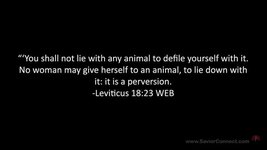jesshotdog
Tourist
In order for this to make sense, you have to think of the Bible not as the literal word of God, but as mankind's attempt to understand the world around them, including the circumstances that shaped their concept of good and evil.
There is not a specific reason as to why zoophilia is considered a sin in the Bible, other than "God commanded it." However, using what we know about why other sins are considered sins in the Bible, I've come to my own two-part hypothesis.
First, consider why family planning measures, such as birth control and abortions, are considered sins. In Biblical times, say a woman had about 8 children. Statistically speaking, only about 1 or 2 would've survived. These children would've had the responsibility of carrying on the family name and to preserve the bloodline. This would've also made a person's fertility important. In other words, sperm and a woman's child-producing ability would've been considered high in value. That being said, it would've been considered abhorrent for sperm and eggs to be wasted on animals.
Second, this one applies to various other sins as well. Consider that in biblical times, we had no idea why diseases existed, so many were considered the physical manifestations of God's punishment. But although they did not have the knowledge of today, they did have logic. They began to notice that certain acts would end in these "punishments," thereby making the action that led to the punishment a "sin." The Book of Leviticus is where most of these so-called "sins" are concentrated. That's why acts such as gay sex, sex outside of wedlock, eating shellfish, and even zoophilia were considered sins; because in those days, those acts were dangerous! Venereal diseases, parasites in fish, possible infections for a woman having sex while on her period, these kinds of things were a real danger back then. But because we didn't know how disease worked, we just considered these acts to be "sins" because they used to lead to disease, unlike today. Basically, laws in the Bible, such as those in Leviticus, were man's first attempt at sanitary law.
The mistake we make today is trying to apply the laws from back then to present society.
There is not a specific reason as to why zoophilia is considered a sin in the Bible, other than "God commanded it." However, using what we know about why other sins are considered sins in the Bible, I've come to my own two-part hypothesis.
First, consider why family planning measures, such as birth control and abortions, are considered sins. In Biblical times, say a woman had about 8 children. Statistically speaking, only about 1 or 2 would've survived. These children would've had the responsibility of carrying on the family name and to preserve the bloodline. This would've also made a person's fertility important. In other words, sperm and a woman's child-producing ability would've been considered high in value. That being said, it would've been considered abhorrent for sperm and eggs to be wasted on animals.
Second, this one applies to various other sins as well. Consider that in biblical times, we had no idea why diseases existed, so many were considered the physical manifestations of God's punishment. But although they did not have the knowledge of today, they did have logic. They began to notice that certain acts would end in these "punishments," thereby making the action that led to the punishment a "sin." The Book of Leviticus is where most of these so-called "sins" are concentrated. That's why acts such as gay sex, sex outside of wedlock, eating shellfish, and even zoophilia were considered sins; because in those days, those acts were dangerous! Venereal diseases, parasites in fish, possible infections for a woman having sex while on her period, these kinds of things were a real danger back then. But because we didn't know how disease worked, we just considered these acts to be "sins" because they used to lead to disease, unlike today. Basically, laws in the Bible, such as those in Leviticus, were man's first attempt at sanitary law.
The mistake we make today is trying to apply the laws from back then to present society.




